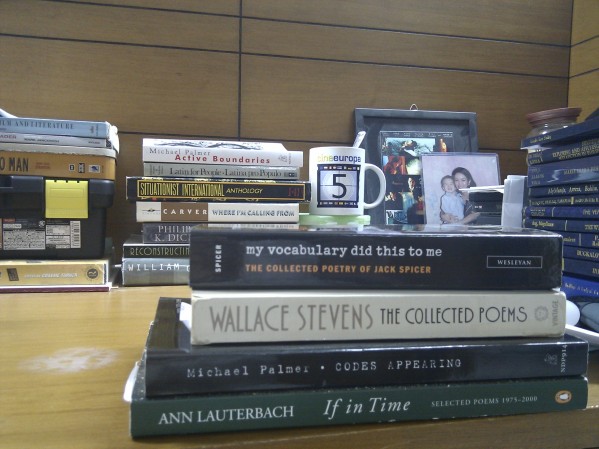This morning I woke up badly wanting to listen to Laurie Anderson’s “O Superman“–most likely triggered by its being the first of many wonderful tracks in the mind’s-ear-blowing playlist at the bottom of this fascinating piece on the “alternative scene” in 1990 Durban, South Africa.
Instead, I listened to “The Building” by the Mekons (and then the rest of the Lipstick Traces CD that accompanied one of my favorite books of all time, the same book Michael Robbins calls “the best book ever written about pop music”)–most likely because of how the experience in sound “O Superman” is seems to me to fit with the “sound poetry” that comprises the Lipstick Traces CD.
And then I remember discussions I’ve had with the friends I’ve made in the Creative Writing program I’m attending. Specifically, I remember talking about how my poems tend to contrast with those of my friend Shane, whose poems I feel are often intimate and quietly erotic whispering (although the two QLRS poems don’t quite demonstrate this as well as some others I’ve read).
My poems, however, I describe as the ravings of a madman on a street corner. Specifically, I’m thinking of what Greil Marcus calls in Lipstick Traces the “shabby old man with a tin whistle, standing in the rain trying to make himself heard (94)” a figure embodied in the desperation that seems about to destroy itself at the same time is is preserved in “The Building.”
Reading what Greil Marcus says about the song makes me feel both inspired and exhausted, reaching toward an ideal I can’t ever fulfill.
+++++
I’ve just discovered Brian Joseph Davis, whose most recent project is visual: The Composites, which are images of literary characters using “police sketch software.” I find that very exciting but not as much as his earlier sound-driven work, which includes a response to Marcus’s discussion of Theodor Adorno.
In Lipstick Traces, despite characterizing Adorno as “no doubt [understanding] the Sex Pistols as a return to Kristallnacht if he hadn’t been lucky enough to die in 1969 (72),” Marcus nevertheless asserts that “you can find punk between every other line of Minima Moralia (ibid.),” and that
After 1977, a spoken rant lp could have been made into an album called Big Ted Says No and it would have made perfect pop sense, and for that matter it did: listen to Metal Box by PiL, Johnny Rotten’s post-Sex Pistols band, read Minima Moralia as you listen, and see if you can tell where one leaves off and the other begins. (72-73)
Davis, in his words, “take[s] this pop wish and make[s] it come true” with four songs that use Adorno’s aphorisms as lyrics howled along to the backing of music from such songs as, say, Minor Threat’s self-titled song. Davis’s Minima Moralia is mentioned here, albeit all too briefly.
Davis’s other recordings include:
- Voice Over (a single track composed of 5000 movie taglines),
- a women’s chorale performing the End-User License Agreement on Sony/BMG’s notorious rootkit CD releases,
- 22 songs by the Carpenters played simultaneously as part of Greatest Hit,
- 10 Banned Albums Burned Then Played (from Stravinsky and Mahler to the Dead Kennedys and 2 Live Crew),
- passersby trying to remember the lyrics to the Beatles’ “Yesterday,”
- an Original Soundtrack of 20 television sets and DVD players playing the “endlessly looping musical cues” from DVD menus









